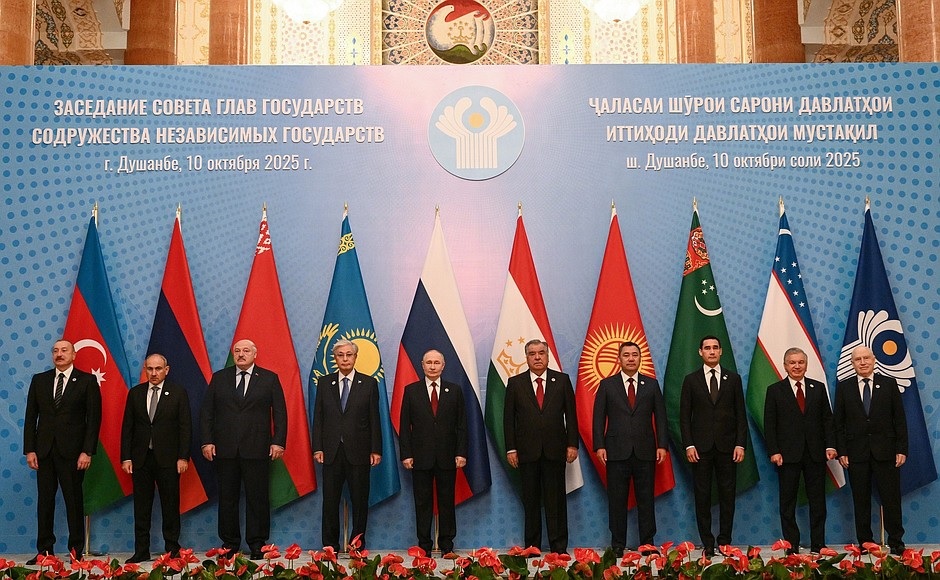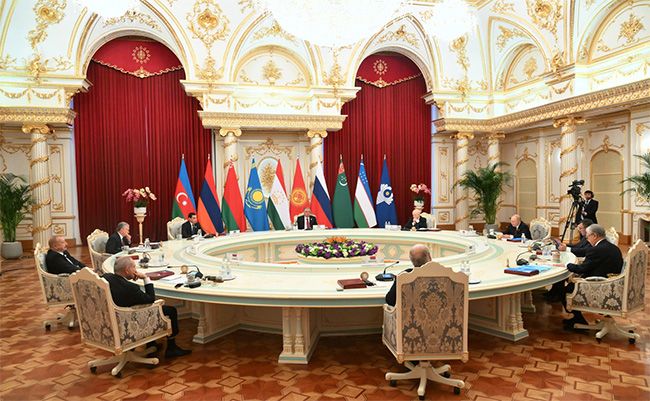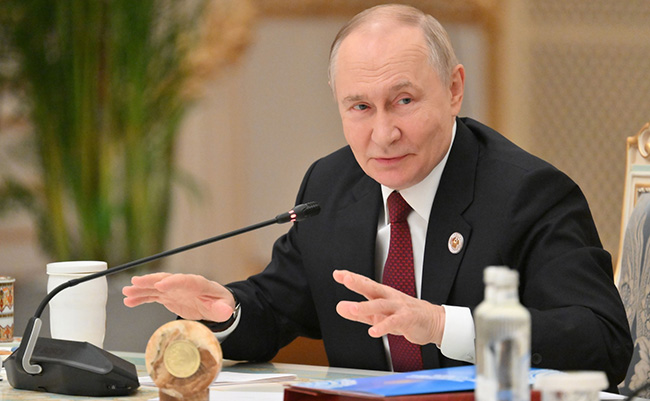 Before the meeting of the Council of Heads of State of the Commonwealth of Independent States.
Before the meeting of the Council of Heads of State of the Commonwealth of Independent States.
Photo: Kremlin.ru
The Nation Palace in Dushanbe hosted a meeting of the Council of Heads of State of the Commonwealth of Independent States.
October 10, 2025, Dushanbe.
The CIS leaders’ summit began with a restricted-format meeting, following a welcoming ceremony and a joint photo session. Participants include President of Russia Vladimir Putin, President of Azerbaijan Ilham Aliyev, Prime Minister of Armenia Nikol Pashinyan, President of Belarus Alexander Lukashenko, President of Kazakhstan Kassym-Jomart Tokayev, President of Kyrgyzstan Sadyr Japarov, President of Tajikistan Emomali Rahmon, President of Turkmenistan Serdar Berdimuhamedov, President of Uzbekistan Shavkat Mirziyoyev, and CIS Secretary-General Sergey Lebedev.
The international consultations continued in an expanded format with the participation of delegation members. The Russian side was represented by Deputy Prime Minister Alexei Overchuk, Deputy Chief of Staff of the Presidential Executive Office and Presidential Press Secretary Dmitry Peskov, Presidential Aide Yury Ushakov, Ambassador Extraordinary and Plenipotentiary of the Russian Federation to Tajikistan Semyon Grigoryev, Deputy Foreign Minister Alexander Pankin, and Russia’s Permanent Representative in the Statutory Bodies and Other CIS Agencies Andrei Grozov.
Following the meeting, a package of documents was signed.
In particular, the decisions signed govern the activities of the CIS Commission on Human Rights for 2023–2025 and establish new frameworks for cooperation among CIS member states in countering terrorism and extremism (2026–2028), strengthening border security at external borders (2026–2030), combating transnational crime, and enhancing regional energy security.
In addition, several decisions were adopted, including the Concept of Military Cooperation between CIS Member States until 2030 and an agreement to establish the Commonwealth of Independent States Plus format. The summit also yielded joint statements on cooperation in combating money laundering, financing of terrorism, and the proliferation of weapons of mass destruction; on the occasion of the 80th anniversary of the United Nations; and in connection with the 40th anniversary of the Chernobyl accident; and a decision to grant the Shanghai Cooperation Organisation observer status within the Commonwealth.
The proceedings concluded with a special award ceremony. Mikhail Shvydkoy, Special Presidential Envoy for International Cultural Cooperation and Co-Chair of the Board of the CIS Interstate Fund for Humanitarian Cooperation, presented the Fund’s medal “For Special Contribution to Humanitarian Cooperation” to Emomali Rahmon.
 Photo: Kremlin.ru
Photo: Kremlin.ru
Speeches at the restricted-format meeting
President of Tajikistan Emomali Rahmon:
Heads of state, heads of delegations,
I cordially welcome you to Tajikistan. We are always pleased to welcome friends and partners to our country, with whom we are united by shared interests and a common desire to expand cooperation.
I wish you all a pleasant stay in Dushanbe, and to all of us – productive discussions and constructive decisions. I hereby declare the regular meeting of the Heads of State Council of the Commonwealth of Independent States open.
As this year’s Chair of the Commonwealth of Independent States, Tajikistan has been undertaking comprehensive work to effectively implement our common goals, in close cooperation with all member states and the executive committee.
Dozens of events at various levels and in different formats have been held, with priority given to enhancing the organisation’s effectiveness. We have continued to work on expanding trade and economic cooperation, improving transport and logistics connectivity, and advancing digital integration. The humanitarian dimension has also been actively promoted.
 Photo: Kremlin.ru
Photo: Kremlin.ru
Vladimir Putin:
Like my colleagues, I would like to thank President Rahmon and all our friends from Tajikistan for organising our work here. This always requires significant effort, and we can see that our hosts have gone to great lengths to create a productive and welcoming atmosphere.
As has been rightly noted, for over three decades the Commonwealth of Independent States has firmly established itself as an influential regional and integration association. But most importantly, we have managed to do more than just maintain a platform for dialogue; we have developed a common market and a shared humanitarian space.
I believe it is profoundly important for the citizens of our states that we have preserved this foundation. We are not only preserving the economic, social, and cultural ties that were forged over our many years as one state, but we are also building upon them, creating a new framework for our partnership. And I believe we have succeeded in this.
In terms of our economic cooperation, I can add to the figures just cited by President Tokayev regarding Kazakhstan. Russia’s trade with CIS countries grew by 7 percent in 2024 alone, reaching $112 billion.
Furthermore, the structure of this trade is consistently improving – a point of high importance. The emphasis is shifting towards a growing segment of high value-added products. So, I will reiterate: our trade is indeed improving from year to year.
Our countries are creating a stable financial infrastructure that is independent of outside influences. Today, practically all mutual settlements are carried out in national currencies. In the first six months of 2025, their share in commercial transactions between CIS member states amounted to 96 percent.
However, this does not mean that we are refusing to use other payment instruments and currencies. It is just that this enhances our independence and sovereignty. This is an obvious thing, in the present-day world in particular. This makes it possible to expand commodity exchanges, make reciprocal investments, and develop our own capital market regardless of the international economic situation.
I also listened attentively to Mr Lukashenko’s proposal on intensifying our economic ties within the CIS. We all know well how our relations have fared over all these 30 years. It is not by chance that the EAEU came into being: we failed to find mechanisms that would be acceptable for all participants in this process within the CIS framework.
This is why a group of countries emerged that opted for intensifying their trade and economic ties. And this is what the EAEU is all about. The EAEU’s doors are always open, of course. My colleagues and I talk about this in some way or other.
As I see it, this is beneficial, economically beneficial, with major markets being opened at the very least and more scope for cooperation created. In the final analysis, this is useful, just useful, and that’s for certain. True, today’s economic situation has taken a specific shape. But how high has our trade with Armenia popped up? What is the trade turnover with Armenia today?
Prime Minister of Armenia Nikol Pashinyan: For billion this year. There was about nine billion last year.
Vladimir Putin: How much? No, there is more this year. There was more last year, and there will be more this year. This is plain and simple. Well, no matter.
What is important is that, generally, the instruments we use within the EAEU provide opportunities even when the economic situation is developing in an unusual way as it were. But this can be utilised to take advantage of the emerging opportunities.
But if – and some colleagues and I do continue this dialogue – something can be done additionally within the CIS, then I agree with Mr Lukashenko. Why not? If certain additional instruments and mechanisms, which someone would like to introduce, serve to promote our cooperation… Why not? We should aspire to this, because it is hard to disagree with the idea that economic collaboration lies at the base of solutions to all other problems.
Of course, we must also support business entities within the Commonwealth in carrying out major industrial and infrastructure projects. New Eurasian production and transport chains are now taking shape, while transcontinental North–South and East–West logistics corridors are being upgraded, discussed, and actively developed.
I listened with great interest to Mr Tokayev’s remarks about Kazakhstan’s plans and their implementation. Indeed, Kazakhstan, with its vast territory, lies at the very heart of the Commonwealth, offering vital logistical advantages for nearly all of our countries.
Import substitution efforts are actively progressing within the CIS. However, as we now recognise in Russia – and I believe this applies to all of us – the goal is not merely to replace something, but to take the lead in certain fields. And not on the periphery of development, but in its key areas. We undoubtedly have the potential to achieve this, there is no doubt about it.
However, we must move beyond mere self-sufficiency, but strive for leadership in specific fields. This is entirely achievable, given our intellectual potential, an inheritance from the Soviet Union that, fortunately, continues to develop actively today.
Innovation, digitalisation, and the efficient, integrated use of natural resources are key factors in this effort – self-evident priorities that no one would dispute.
An important area of cooperation among the Commonwealth states is the joint fight against terrorism, extremism and corruption. We are making every effort to strengthen collaboration across a broad range of fields, and therefore fully support the documents being adopted today.
These include an action plan on counterterrorism, a set of joint measures to protect external borders, an updated concept for military cooperation, a statement on combatting transnational crime, initiatives to counter money laundering obtained by criminal means, and steps to enhance energy security.
And of course, I fully agree, as Mr Aliyev rightly noted, on the importance of our cooperation in the cultural and humanitarian sphere. Colleagues have also mentioned sports events, and the recent Commonwealth Games held in Azerbaijan are a prime example. This was a major event that certainly deserves the full attention and support of all our countries. A large team of Russian athletes took part in them as well.
In 2025, we have all gone to great lengths to mark the 80th anniversary of Victory in the Great Patriotic War, and almost all our colleagues have already mentioned this in their remarks. I would like to thank the CIS leaders who came to Moscow on May 9. It is symbolic that army units from CIS countries joined the Russian military to march through Red Square during the Victory Day parade. For that, you also have my gratitude and recognition.
It is also important that Russia’s proposal to create a new honorary title City of Labour Valour resonated with our partners within the CIS. This title has already been awarded to 19 cities in seven CIS countries to celebrate their people who made a special contribution to our shared victory over Nazism.
We have been coordinating our foreign policy efforts too and compare notes on a continuous basis. This is important considering the way the international environment has been evolving. In this context, we believe that the joint statement on 80 years since the UN’s establishment is quite timely. It will be submitted for approval to the Council today. Colleagues have also mentioned this.
By the same token, just as many of those present here today, we support efforts to forge closer contacts between the CIS and the Shanghai Cooperation Organisation, as per the draft decision to grant the SCO observer status within the CIS. In fact, it makes every sense to use the potential these two organisations have in terms of their cooperation for promoting safe and steady development for our countries and the entire Eurasian region.
We support the principled decision we will be taking today to establish the CIS-plus as a new operating framework. This will make us more agile and proactive when attracting other countries and international structures to work with our organisation.
Of course, we are grateful for supporting Sergey Lebedev’s nomination for the position of Secretary-General. Everyone knows him well, and I think that his results prove that he is worthy of continuing to perform his duties in this position.
It goes without saying that I wish our friends from Turkmenistan every success as they prepare to assume the CIS chairmanship in 2026.
As we have already mentioned during informal conversations, I would like to see you in Russia, St Petersburg, if it would be possible for you, and in keeping with the tradition we have to meet ahead of New Year for holding an informal meeting.
I have already discussed this with some of our colleagues here and informed them about the outcomes of the meeting on the Ukraine settlement with the Americans in Alaska’s Anchorage. We will have a chance to meet in an even more private setting. When it happens, I will inform you about these outcomes in greater detail. Overall, we believe that they were quite positive. Of course, all our future efforts to achieve a settlement in Ukraine rely on the fundamental takeaways from the Alaska meeting.
Thank you.
read more in our Telegram-channel https://t.me/The_International_Affairs

 16:21 10.10.2025 •
16:21 10.10.2025 •






















